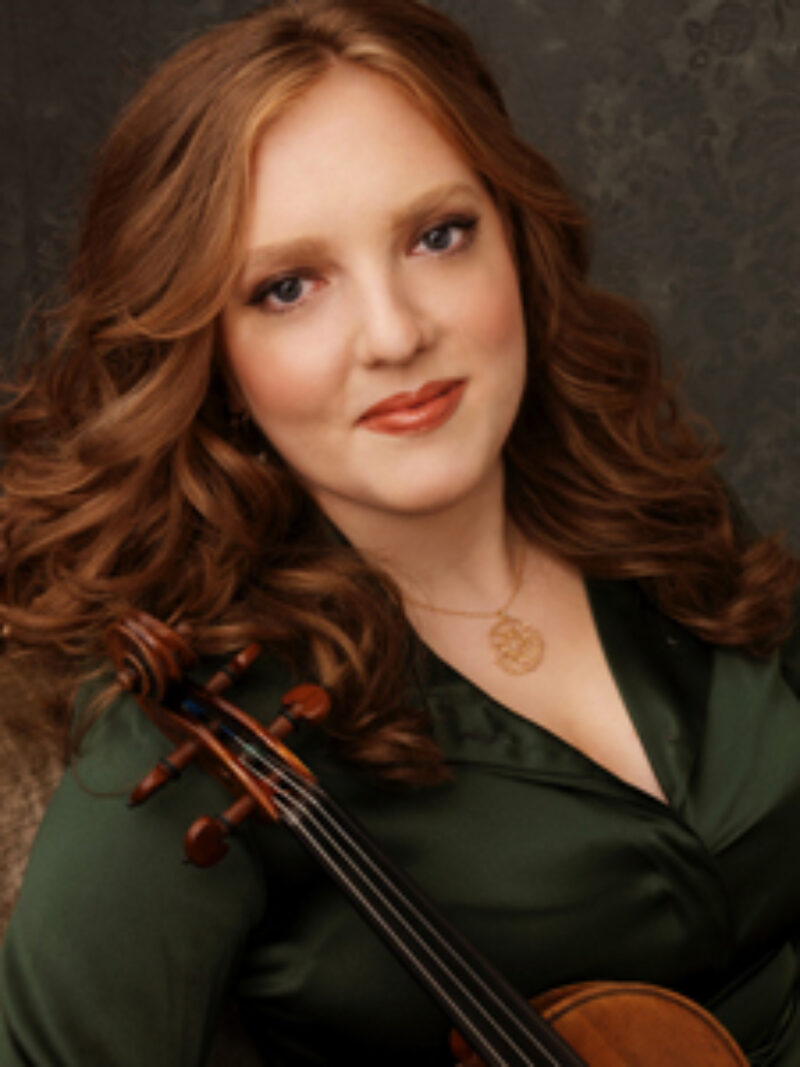Music is Meant for Young People
An Interview with Rachel Barton Pine

Rachel Barton Pine is an accomplished young violinist whose musical interests cross genres, incorporating classical, baroque, and heavy metal music. This Saturday, she will be conducting the Seattle Baroque Orchestra and performing works by Vivaldi, Pisendel, Telemann, and Handel all while playing the viola d’amore. Rachel currently is on a worldwide tour, but Audrey L. of the TeenTix Press Corps got the chance to interview her about her musical perspective and upcoming concert.
Can you describe your musical background? When did you start the violin and how has your career transformed since then?
So I first started playing the violin when I was 3 years old. There were some middle school girls playing in my church, and they had on the most beautiful long dresses. I loved those dresses and was really intrigued by the sound of the violin, so I started begging my mom to let me play. Finally, there was a teacher in my neighborhood that summer. I went down the street to learn from her and I fell in love with the violin that way. I just became obsessed with it.
My parents were the opposite of pushy parents and my mom never told me to go practice. They’d actually encourage me to stop practicing and have some fun. But they were very supportive when they realized how much I loved the violin.
I first soloed when I was 7 years old. Around that time, I got quite busy with concerts and rehearsals. Then, when I was in third grade my school principal took my parents aside and suggested that they homeschool me. Homeschooling really did save my childhood and make it a lot more normal. When I was going to school, I would be in school all day and do my homework on the way to rehearsal. I’d eat my meals in the car and do my practicing when I got home and, you know, that was my whole life. Once I was homeschooled, I could do a lot of my music during the regular school hours and the academics took a lot less time doing it all by myself. So, therefore, I actually had my afternoons back to hang out with friends.
As I grew up, I just gradually started doing more and more concerts I made my first album when I was 18 years old. These days, my life consists of non-stop touring. I’m in a different city or country every single week. But I’m very, very lucky because my husband travels with me and works from his computer. Now, we have our baby, who was born in September 2011, and she travels with us too.
For the upcoming concert on Saturday, you’re playing the viola d’amore with the Seattle Baroque Orchestra. Can you explain what a viola d’amore is and why you’ve chosen to solo on it?
The violin and viola da gamba families developed in the very late 1400s. The treble size is close to the violin size and played in the lap. And those two families developed at the same side. The viola da gamba was fitted with 6 strings and came in many sizes. The treble size was closest to the violin size but was played in the lap. Then, you of course have the violin. Those two families existed for decades before the viola d’amore arrived on the scene in the 1600s. The viola d’amore is played like the violin. It has 6 playing strings and an equal number of resonating strings underneath. You tune it to whatever the key of the piece is. In that respect, it just rings and rings with a unique and gorgeous silvery voice. It’s just a beautiful instrument. It was a real brain-twister to learn how to play it with all those extra strings, but definitely worth it because the sound is so beautiful.
While Saturday’s concert is entirely Baroque music, you’re also interested in many other genres, including rock. What facilitated this somewhat unusual venture into a genre not often explored by concert soloists?
My listening tastes are similar to everyone else my age, except I also listen to classical. That’s actually an important message I try to spread: You don’t have to be into just one thing. You can like a variety of things because the more good music the better. As a teenager, I listened to various rock and pop groups.
Today, I’m enamored by heavy metal for its intensity. The serious genres, like thrash, have a lot of compositional complexity which actually derives from classical music. Because of this, there are actually a lot of people who like both classical and heavy metal and that’s it. I like a lot of other things too, but those are definitely my two favorites. For the encore on Saturday — if the audience would like one — I’ve made a special medley of Nirvana songs for the Baroque orchestra. It should be really fun.
On that topic, who are your musical favorites?
Well, I like heavy metal and thrash. Early Metallica and Megadeth are huge influences. I also love Ozzy Osbourne.
Within the classical world, my biggest violin hero is Maud Powell. She is receiving a lifetime achievement award from the Grammys next week in Los Angeles, and I have the great honor of accepting the award on her behalf. Powell lived from 1867-1920 and was the greatest woman violinist and greatest American violinist of her time. She actually premiered the Tchaikovsky and Sibelius violin concertos in the United States for the first time, and insisted that, though modern, these works would eventually be loved by the public. Additionally, she championed the works of black and women composers, which was somewhat unheard of at the time. She also created one of the first integrated string quartets and sat as first violin with a male second violin. Lastly, Powell was the first violinist to record on a wax cylinder and made many recordings over her life to share classical music with a broader public.
Do you believe elementary music education is just as important as traditional academic education?
Yes, definitely. More and more research shows that music helps to build logical thinking and helps children learn to focus. In that aspect, music can excel academic work. But music does more than that — it nurtures the soul. Through music, we learn how to explore our humanity. And that’s so essential. The arts give us a better society with people more in touch with their own feelings. So, yes, music education is essential.
What’s the greatest musical challenge you’ve had to overcome? How did you surmount it?
For me, music is satisfying. But there’s so much more to music than just performing. Music history, actually, is one of my passions simply because it’s so very interesting. I also love analyzing the score, the architecture of the piece. In this way, you can add so much more when you hone your skill on the instrument. And when you get on the stage and share your music and feelings, it’s incredible. For me, it’s all fun and it’s all challenging. I guess I can say that, for many people, it’s hard to never settle for already sounding good. You’ve got to ask, “How can I still get better?” You always can be better. There’s no finish line.
Do you have any exciting recording projects or concerts in the works?
I’m constantly on the road. I’m going to Alaska for the first time soon, and after that, I’ll be performing a medieval music concert in Chicago. But I’m most excited for recording the complete Mozart violin concertos with Neville Marriner and the Academy of St. Martin in the Field. This conductor and orchestra actually were the orchestra heard on the soundtrack to Amadeus, so it’s very exciting for me to work with them. You simply don’t find any better Mozart players. And, unlike most modern violinists, I plan to write my own cadenzas for the recordings. Sharing my interpretations of these concertos is very exciting for me.
Any last words of advice for young musicians or the musically inspired?
I’d just like to add that music is meant for young people. Vivaldi was the music director at a girl’s orphanage in Vienna where all the girls studied music. The girls were named by their instrument; one girl who played the violin was called Anna Violina. So, when you hear all the great Vivaldi, at my concert and elsewhere, just remember all of Vivaldi’s compositions were written for teenage girls.
Seattle Baroque Orchestra presents ‘Dresden Concertos’ with Rachel Barton Pine
Town Hall
8:00 p.m. on January 18


